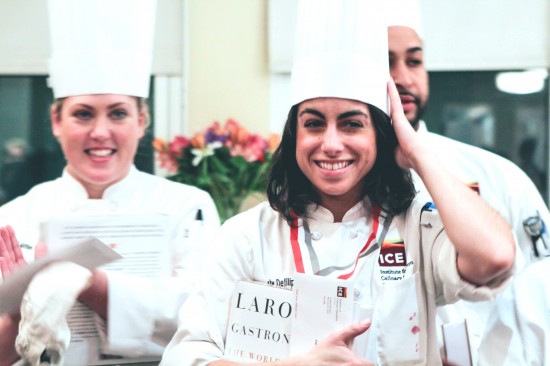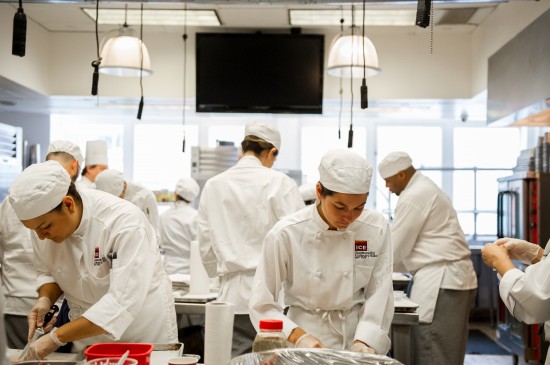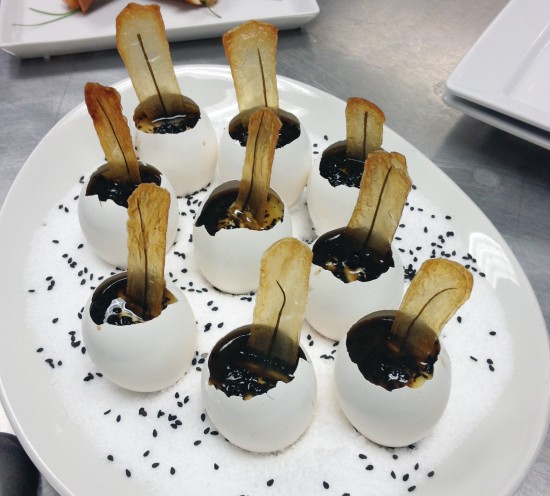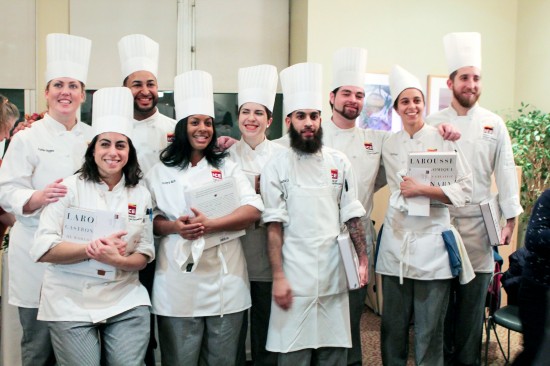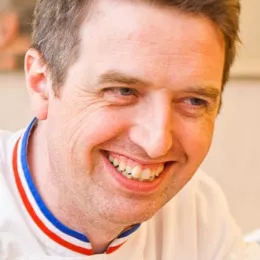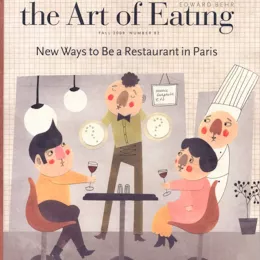When I first stepped into the kitchens at ICE seven months ago, it never felt like this day would come. But somewhere between knife skills 101 and our market basket challenge, I began to discover my “culinary voice” and a professional direction for my creative future in food.
Graduating from culinary school felt different from any prior graduations I’ve experienced — perfecting a hands-on skill is entirely different than writing papers, crafting persuasive arguments, or memorizing facts and dates. Sure, culinary training involves a bit of typical academic work, but it’s ultimately about honing your instincts and hands-on skills, about becoming that guy or girl someone can count on when the going gets rough.
In the corporate world, I’ve heard people use the phrase “putting out fires” to describe the stress of last-minute deadlines. But in the kitchen, no matter how well you plan and prep, every task is still a last-minute deadline. The turnaround between getting your clients’ order and delivering your product typically takes less than thirty minutes. It makes even the most notoriously stressful desk jobs sound almost easy.
Luckily, for our graduation, we weren’t working as short-order cooks. Our assignment held other challenges: serving up 80 catering portions of a cold appetizer, a hot entrée and a dessert. Working in teams of two or three students, we had to devise dishes that were impressive enough to wow our friends and family, but not so complicated that they couldn’t be prepared within a 10-hour window. (And yes, 10 hours may seem like a lot of time, but if you’ve never cooked for 80 people, it’s really not.)
My teammate Mari and I opted to create three dishes: Thomas Keller’s famous truffle custard, wiener schnitzel and blood orange tiramisu. Each of the dishes held sentimental value: the truffles were one of the most complex dishes from the curriculum at ICE; wiener schnitzel is my mom’s favorite dish; and the blood orange tiramisu recipe was developed by Mari’s coworkers at BAKED in Red Hook.
Each dish presented its own challenges. First and foremost, the tiramisu: neither Mari nor I had ever made a tiramisu cream that included egg yolks — and the original recipe suggested we use them raw. Not wanting to risk poisoning a room full of people (especially people we love!), we had to devise a sabayon strategy with Chef James — an experiment that turned out beautifully, but ultimately cost us valuable time.
Then, the wiener schnitzel: being a deep-fried dish, it could only be prepared so far in advance. So while my homemade cranberry sauce and cucumber pickles were ready to go hours before, I was concerned about keeping my veal hot, dry and crunchy. (It’s worth noting that this predicament — cooking in advance and reheating food — is one of the primary skills we learn in culinary school. You’d be shocked at what you can cook in advance. It just takes experience, training and a dash of restaurant magic.)
As for the egg custard, the complicated, multi-step process meant that Mari had to clean out the shells of nearly 100 eggs. Beyond its tediousness, it was a precarious task, as was slowly cooking the tender custard. While the recipe seemed straightforward when prepared for twenty people, the larger scale of our efforts presented issues of over-salting, perfecting the custard texture and other unforeseen hurdles.
Yet in the end, when we finally served our first dishes as culinary school graduates to our friends and family, all of this anxiety dissolved into pride. First and foremost, our dishes tasted awesome, and it was incredibly satisfying to show our parents and friends how much we’ve learned.
I even got some of the pickiest eaters (ages seven and under) to try my wiener schnitzel! Last, but not least, it was a thrill not only to receive my very first chef’s hat, but also to learn that my classmates had nominated me for the Wüsthof Leadership Award. One of three awards presented at graduation — the others given to “Most Likely to Succeed” and the “Nespresso Top Toque” — it felt particularly special to be recognized by the very peers with whom I had worked side by side for so many months.
It was also exciting to consider my classmates’ futures. Technically, we will not have officially "graduated" until we fulfill a 210-hour externship in the field. I, for one, will be spending the next few months as a recipe-testing assistant for a cookbook, while others have secured externships on the line at such restaurants as Blenheim and Aldea, or even paid positions writing for Delish.com!
In no time, we’ll all be full-blown food professionals, using the contacts from our externships — and the networks of our classmates and the ICE alumni network — to pursue our personal dream jobs. And while I’ll miss our time in the ICE kitchens, I can’t wait to see what will come next.
Click here to learn how ICE supports recent graduates through job placement and externship opportunities.



